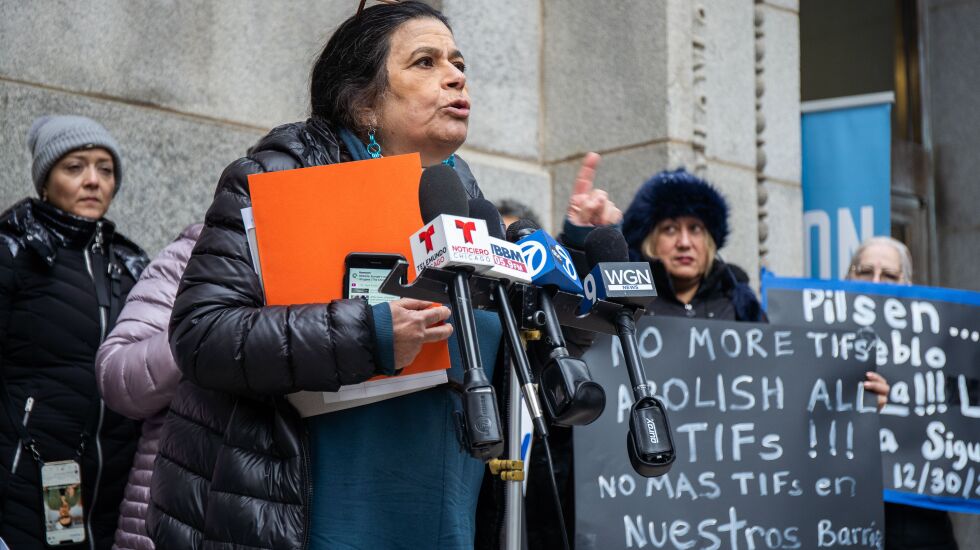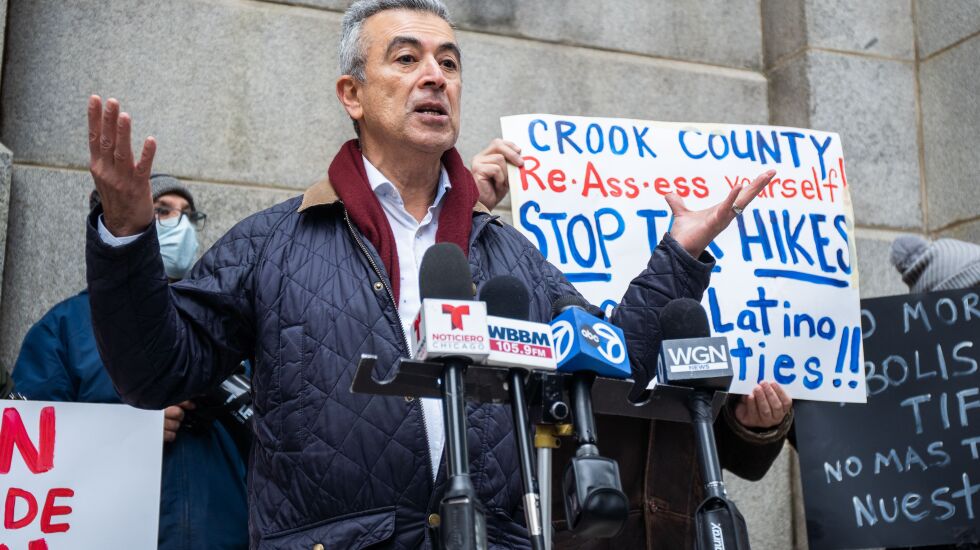
This story has been updated to correct Laura Paz’s affiliation.
Pilsen residents and other concerned citizens gathered in the Loop Friday to protest increased property taxes in their neighborhood.
The higher taxes can drive out longtime residents, contributing to gentrification, they said at a news conference outside the Cook County Building.
That protest comes as gentrifying Latino communities have seen massive property tax increases, sometimes more than three times that of the previous year. The second installments on property taxes were due by midnight Friday.
A caravan of nearly 20 vehicles started in Pilsen, then headed to the Loop, honking their horns and circling the building for nearly half an hour as speakers addressed a crowd of about 20.
Laura Paz, a member of a newly formed coalition of concerned residents, said there’s more at stake than money and the heritage of generations of Hispanic immigrants could be lost.
“We are the main Mexican cultural and intellectual center of Chicago, and we cannot lose that,” Paz said. “To be dispersed would mean we will have no power.”

“This is home,” Paz said.
“We put down our roots, and we feel like we belong,” Paz told the Sun-Times before the caravan started, her voice breaking. “But the gentrifiers see it as a commodity, something to buy and sell and make money.”
The issue affects both homeowners and local businesses.
Juan Girón, a lifelong Pilsen resident, owns Girón Books in the neighborhood. He said his property taxes more than tripled in 2021 — from $26,000 to $85,000, which could force his store to move yet again.
“I can’t keep my bookstore open,” Girón told reporters. “We just cannot continue to operate.”

Part of the issue stems from adjustments made by the Cook County Board of Review.
For 2021 property taxes, the Cook County Assessor’s Office originally calculated Chicago residential properties would bear 46.2% of the property tax burden, with the rest falling on nonresidential properties. According to the assessor’s office, this would have reduced property taxes for homeowners by nearly 6% compared to 2020.
After multiple appeals from “large commercial apartments, corporate offices and data centers,” including one in the 2600 block of Ashland in Pilsen, the Board of Review shifted that burden, according to Scott Smith, chief of staff of the Assessor’s Office — leaving homeowners on the hook for 52.8% of the tax burden.
Smith said Cook County Assessor Fritz Kaegi is now reviewing the reductions made by the board to see how this can be avoided in the future.

Two Board of Review commissioners — Michael Cabonargi and Tammy Wendt — were voted out in November.
Samantha Steele, the Board of Review’s commissioner for District 2, said appeals granted previously did “tend to be in the [city’s] downtown” where many buildings were “vacated because of the pandemic, and the retail and office space markets have been devastated over the last few years.”
Steele said the new commissioners have focused on being more transparent and creating a new algorithm for assessing property values. That new system would look at recent home sales and any “significant” renovations, but gentrified buildings would be taken out of the equation.
As for 2021 property taxes, however, Smith said any changes would now have to be done legislatively.
That hasn’t stopped Paz and the coalition. Among other things, they want the Cook County Treasurer’s Office to stop collecting late fees for 2021 property tax payments.
“Nothing has been given to this community. It’s all been fought for,” Paz said. “[And] people are willing to fight this.”







